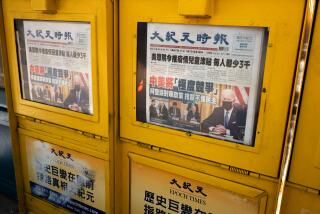Indictments Reportedly Name Keating, 3 Others : Thrifts: Sources say criminal charges are made about the allegedly fraudulent sale of nearly $200 million in American Continental Corp. bonds through Lincoln S&L; branches.
- Share via
A state grand jury investigating the failed Lincoln Savings & Loan has issued sealed indictments of Phoenix developer Charles H. Keating Jr. and three others, and the charges are expected to be made public today, sources said Monday.
The indictments will be the first criminal charges brought relating to Irvine-based Lincoln, which collapsed 17 months ago. The failure is expected to cost taxpayers more than $2 billion, making it one of the costliest ever.
A spokeswoman for Los Angeles County Dist. Atty. Ira Reiner, who in December was appointed a special state prosecutor to investigate Lincoln, confirmed that his office “has concluded its presentation of evidence to the grand jury.” The spokeswoman would not say whether indictments had been issued.
However, sources close to the probe said the state grand jury, which has been meeting in Van Nuys since mid-April, has issued sealed indictments that are expected to be filed in Los Angeles County Superior Court this morning.
The grand jury focused on the allegedly fraudulent sale of nearly $200 million in American Continental Corp. bonds through Lincoln branches. American Continental in Phoenix was the parent of Lincoln, and most of its bonds--now nearly worthless--were sold to Lincoln depositors and elderly investors.
Sources the grand jury had issued indictments against Keating, American Continental’s former chairman; Judy Wischer, American Continental’s former president, and Ray Fidel and Robin Symes, both former presidents of Lincoln.
Keating’s lawyers would not comment on the investigation. Representatives for the others either declined comment or could not be reached.
KCBS-TV in Los Angeles reported Monday night that Keating would be arraigned in Superior Court today on charges of criminal fraud.
Keating and other Lincoln and American Continental officers and directors, as well as the lawyers and accountant who advised them, are also under scrutiny in a wide-ranging federal grand jury probe centered in Los Angeles, Phoenix and Washington.
Also pending is a civil racketeering lawsuit filed by federal regulators against Keating and other former American Continental executives.
American Continental, encouraged by deregulation of the thrift industry, acquired Lincoln in 1984. Keating then directed the rapid expansion of the thrift, investing primarily in junk bonds and Arizona real estate projects.
He attracted the concerns of federal regulators, who tried to rein in his risky investment strategy. He enlisted the aid of several U.S. senators, included Sen. Alan Cranston (D-Calif.) to keep thrift regulators from curbing his operations.
In 1987 and 1988, American Continental raised funds through the sale of $196 million in bonds at Lincoln’s 29 Southern California branches. An additional 8,000 investors had bought nearly $80 million more in other debt securities.
Bondholders have claimed in a mountain of civil lawsuits that Lincoln defrauded them by pushing uninsured, high-risk securities on them while leading them to believe that the bonds were insured.
Bondholders have claimed that Lincoln or American Continental sales people persuaded them to invest in the securities when all they really wanted to do was put their money into insured certificates of deposit.
Their lawyers characterize the sales technique as “classic bait and switch.” In some cases, investors were told the securities were insured. Some investors were never given a copy of the securities prospectus, a long document that is supposed to state the risks involved in buying the securities.
The bondholders also claim in their lawsuits that Keating and Lincoln were aided by state and federal politicians and by employees and consultants who were former government officials. Even Alan Greenspan, as a private economist before becoming chairman of the Federal Reserve Board, testified before Congress on behalf of Lincoln and its effort to continue investing in risky real estate ventures and ungraded securities known as junk bonds.
Keating has steadfastly claimed he has done nothing wrong, and charges that incompetent regulators were the cause of Lincoln’s collapse. Last year he sued to regain control of Lincoln, saying the thrift was not insolvent when it was seized by regulators.
But U.S. District Judge Stanley Sporkin dismissed Keating’s suit to recover the collapsed thrift and said it was “abundantly clear” Keating and other officials abused their positions and looted Lincoln.
The Office of Thrift Supervision now is seeking restitution of $41 million from Keating, saying he diverted Lincoln funds for his own use. The agency, challenging Keating’s assertion that he is broke, also demanded an accounting of his personal finances.
More to Read
Inside the business of entertainment
The Wide Shot brings you news, analysis and insights on everything from streaming wars to production — and what it all means for the future.
You may occasionally receive promotional content from the Los Angeles Times.










